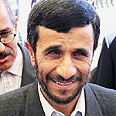
Ahmadinejad: We can better lead the world
Iranian president says nuclear standoff with West can be resolved peacefully; adds: ‘there is no need for UN sanctions against his country; US should moderate its language’
Iran President Mahmoud Ahmadinejad said Thursday that his country’s nuclear standoff with the West can be solved through dialogue, while calling for unspecified “new conditions” in negotiations.
Ahmedinejad, on an hours-long stopover in Senegal en route to Cuba for a summit of the Nonaligned Movement, said the debate over Iranian nuclear enrichment could be solved peacefully.
"We’re partisans of dialogue and negotiation. We believe that we can resolve our problems in a space of dialogue and justice - together,” he told reporters. "I must announce, we’re available, we’re ready for new conditions” in talks, he said without elaborating. Ahmadinejad spoke in Farsi, with his comments interpreted into French.
Oil-rich Iran says it needs uranium enrichment to produce fuel for nuclear reactors that would generate electricity. Enrichment can also create material for atomic bombs, however, and the United States and other nations suspect that is Tehran’s real goal.
Asked if he believed his country would be slapped with UN sanctions, as pressed by the United States, Ahmadinejad said there was “no reason” for sanctions and called on the US to moderate its language.
"The American leaders should prefer to not speak in an angry fashion,” he said, before asserting that his country is a natural international leader.
Declaring solidarity with Africa
“We believe the on the basis of law and justice, we can better lead the world,” he said at an early-morning briefing, amid a powerful electrical storm that brought power cuts to the conference hall, before flying onto Cuba. Ahmadenijad earlier met with President Abdoulaye Wade of Senegal, a heavily Muslim and deeply impoverished West African nation.
Ahmadinejad last visited West Africa in July, when he addressed an African summit in Gambia, declaring solidarity with the impoverished continent and lashing out at the West.
Then as now, Iran was locked in a dispute with the United States and European Union over its nuclear program. Iran is in negotiations with the West, but faces sanctions for rejecting the UN Security Council’s demand that it freeze uranium enrichment, which can be used to make nuclear arms. The United States is considered a strong ally of Senegal. Most of Senegal’s 12 million people are Muslim, practicing a moderate and sometimes mystical version of the faith heavily influenced by local religious leaders, called marabout.
While deeply impoverished, Senegal has never seen a coup d’etat and Wade, a longtime opposition leader, took power after winning elections in 2000 that vanquished the party that had ruled since independence from France in 1960.










